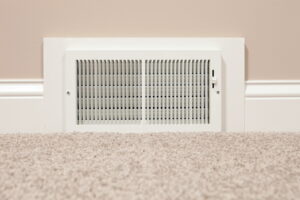Hydronic Boiler Systems in Bremerton are very popular because of their reliability and efficiency. Just like any other appliance though, hydronic heating maintenance is needed periodically, especially as units age, and they can happen for many reasons. The first step is to make sure you’re actually dealing with a breakdown and not something much more simple. If you’ve lost heat from your boiler, check to make sure there’s fuel in your oil or gas tank before making a service call. Also keep in mind that part of the heating system is electrical. A recent power outage or short circuit in the house could have tripped the circuit breaker for the boiler.
Next, check the emergency shut off switch. It looks like a typical wall light switch but with a red cover and bold lettering indicating the off and on positions. It’s usually placed in a convenient spot in the basement. In many Bremerton homes it’s located at the top of the basement stairs. Sometimes the switch is turned off accidentally, but if a repairman or someone else in you house turned it off for a reason, you need to find out why.
If the emergency switch is on and all the circuit breakers are on and there’s plenty of fuel, the next step in diagnosing the problem is checking the boiler. First, understand that most heating appliances automatically shut down when a critical component stops functioning properly. Don’t put yourself or your family at risk. Don’t attempt to restart or repair the boiler yourself. But you can help the HVAC technician help you by checking a few simple things before making the call.
A puddle on the floor usually means a pipe or valve is leaking. A drop in the water level inside the boiler could have triggered the shut down. But leaks in joints can also occur when something else shuts the boiler down and the metal plumbing shrinks. Is the puddle getting larger or is it stagnant?
If there’s no leak, carefully touch the copper pipes running in and out of the top. If some are hot and others cold, the boiler is probably working but some of the zone controls or thermostats may be broken.
If all the pipes are cold, carefully touch the metal panels covering the boiler. They usually warm up a bit when the boiler is operating normally. Listen for the faint hissing sound of the pilot light. If the boiler is cold and completely silent, the pilot light may have gone out, triggering a shut down. Don’t attempt to relight the pilot unless you’ve done so before. The HVAC technician can show you how to do it. Keep in mind that many new boilers in the Bremerton area have pilotless electronic ignitions.
If the pilot is lit but the pipes and boiler are cold, and boiler uses fuel oil, the burner motor may have stopped working. The burner motor is a separate, smaller unit attached to the boiler. Most burners have a red reset button that pops up when there’s a burner malfunction. Try to locate the button and decide if it’s popped up, but don’t reset it. Call an HVAC technician first. Restarting a malfunctioning unit may cause further damage. Oil burner motors can stop working for many reasons, including soot blocking the air supply, blocked fuel line, dirty electrodes inside the motor, or seized up bearings. Only a licensed HVAC technician can correctly diagnose and fix such problems.
Please call Sound Heating if you have any questions about these tips.
Continue Reading
Tags: Bremerton, Renton, Steilacoom
Posted in Heating, Hydronic Boiler Systems, hydronic heating maintenance | Comments Off on No Heat From Your Boiler in Bremerton: Causes and Solutions
 It is no surprise that it gets cold here in Washington – really cold. Winter is just around the corner and you’ll be turning your heater on soon if you haven’t already. And if you’re hoping to stay comfortable this winter, you need a heating system that is designed to withstand the frigid temperatures we can expect.
It is no surprise that it gets cold here in Washington – really cold. Winter is just around the corner and you’ll be turning your heater on soon if you haven’t already. And if you’re hoping to stay comfortable this winter, you need a heating system that is designed to withstand the frigid temperatures we can expect. 